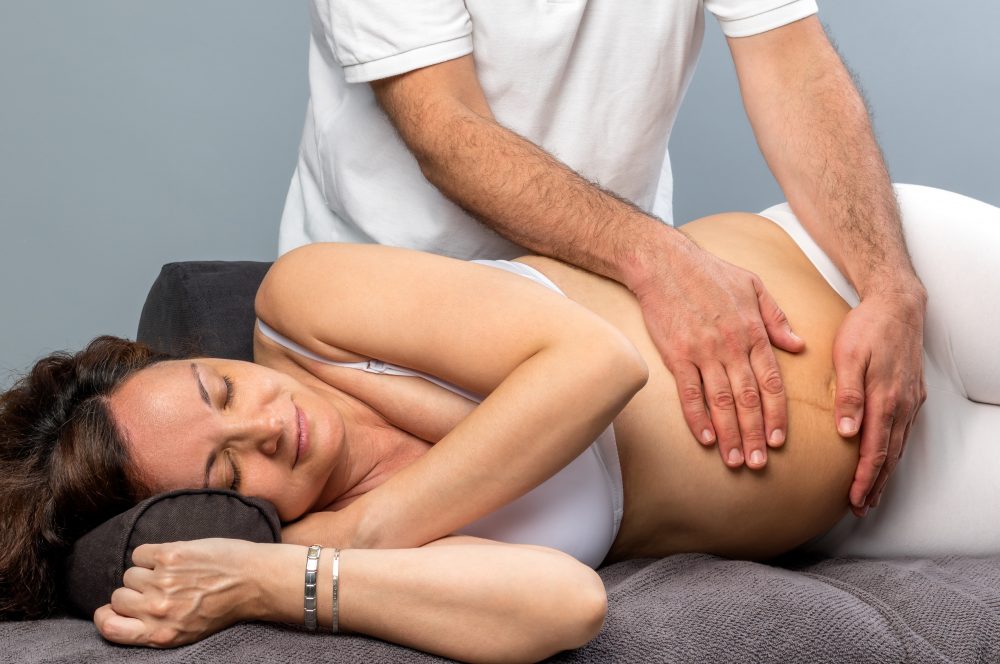Physiotherapy for Pregnant Women in Brighton
Physiotherapy during pregnancy
Pregnancy is a very special period in the life of every woman, but it also come with pains, discomfort and struggles.
Your body goes through a lot of changes when you get pregnant, from hormonal changes to physical changes, both of which can significantly affect your daily routine.

During and after pregnancy, you may experience pains and aches, with backache being the most common issue faced by pregnant women. Some people experience changes in the functions of their bladder, bowels and pelvic floor.
Some of these issues are completely normal and should be expected, but in some cases, the pain and discomfort can be overwhelming. If your delivery involved a c-section, it may take some time for your body to fully recover. In cases like these, physiotherapy is your best option.
Visiting a physiotherapist during your pregnancy and even after giving birth can help prevent and treat common pregnancy issues, as well as aiding recovery after childbirth.
Why you need physiotherapy during pregnancy
It is not advisable to ignore the condition of your body during pregnancy. Pain, discomfort and inconsistency are some of the signs your body gives to let you know it needs attention, and it is vital that you pay attention to these signs during and after pregnancy.
Proper physiotherapy and osteopathy can help you prevent and treat most, if not all of the issues you are likely to experience during pregnancy.
Here are some of the reasons you should seriously consider physical therapy when pregnant:

Physiotherapy can help in pelvic floor rehabilitation:
During pregnancy, there is a small risk of developing pelvic health complications. Some of the problems that most pregnant women experience include: incontinence, pelvic organ relapse, and pain during sexual intercourse.
Therapists who are trained in taking care of pregnant women know how to assess the tissues, nerves and muscles of the pelvis, and recommend exercises that would strengthen this area.
Part of the exercises and activities you will go through will also teach you how to push effectively when delivering your baby. Proper childbirth will also reduce the chances of pelvic floor trauma, or any other post-delivery problems.
Physiotherapy will help with posture changes that occur during pregnancy:
During pregnancy, your body undergoes a lot of strain. Some of the physical changes that come with pregnancy include retention of body fluid, increase in size and structural weakness.
In most cases, these physical changes can alter the alignment of your spine and cause changes in posture that if not handled on time, can result in lower back pain and a number of other discomforts associated with pregnancy.
However, with proper physical therapy and osteopathy, you will be able to strengthen the core structure of your body, and prevent or treat pregnancy and after-childbirth back pain.
Physiotherapy helps in preparing for pregnancy:
Physiotherapy helps prepare your body for when you get pregnant including ensuring that your body is properly aligned and ready to carry a baby. If you are recovering from previous injuries, pregnancy can add more to the strain and pain, a condition that can result in pregnancy complications.
Physiotherapy involves a number of activities and exercises that would strengthen your body, so that you can carry a baby comfortably, and give birth safely.
Getting physiotherapy when pregnant
If you are planning to get pregnant, or you are already in the early stages of pregnancy, physiotherapy is your best option if you want to avoid or reduce that pain and discomfort that you will experience during your pregnancy.
Physiotherapy has been used to treat pain and repair internal body damage for a long time, and opting for it will also prepare you for most post pregnancy issues, effectively making the entire pregnancy experience an easy one.
At Brighton and Hove Physiotherapy and Osteopathy, we have the skills and resources to provide the type of physical therapy that would help you have a stress-free pregnancy. Call on today on 0000000000 to find out the treatment and therapy options we have for expecting mothers.
Pregnant FAQ’s
All in all, physiotherapy is quite safe for both mother and child, as long as it is done with a well-trained and qualified physiotherapist.
Electrical stimulation of TENS is one of the ways lower back pain is combated in pregnancy; however, because this involves releasing electric pulse in the presence of a growing baby, it should not be your first option.
If you are considering electrical stimulation to combat lower back pain in pregnancy, it is a good idea to first consult with your doctor or physiotherapist.
To this end, you can consider starting physiotherapy during your first month of pregnancy, or you can get expert advice from a qualified physical therapist.
